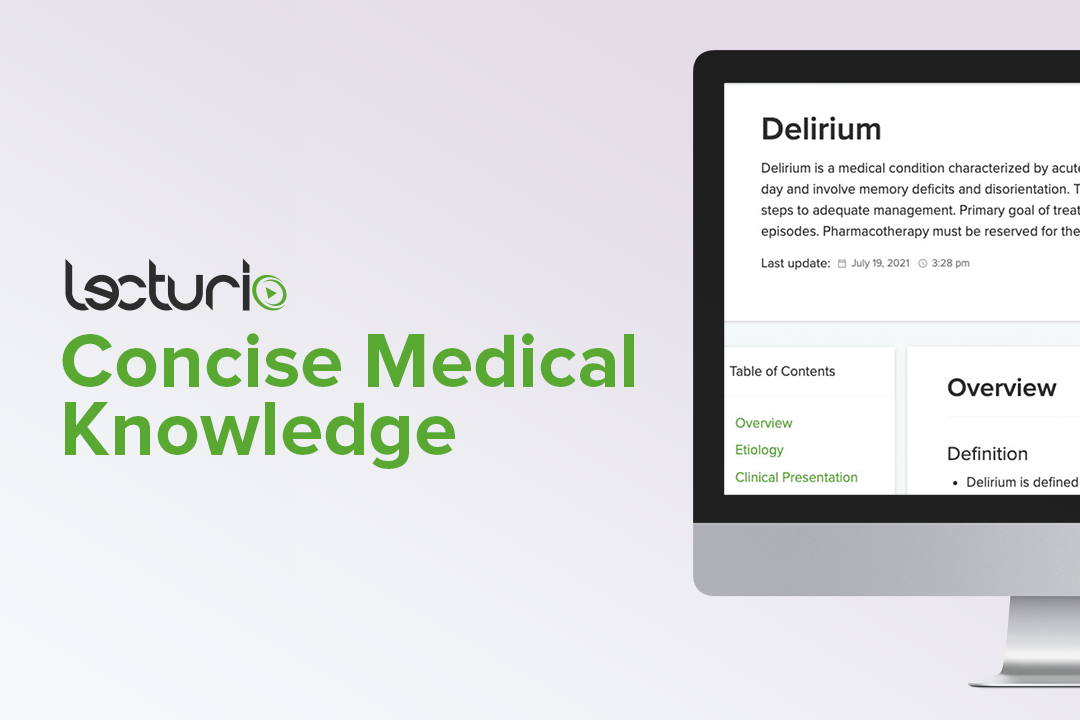Playlist
Show Playlist
Hide Playlist
Difference between Delirium and Dementia
-
Slides Delirium Psychiatry.pdf
-
Download Lecture Overview
00:01 Now, I wanna emphasize the importance of knowing the difference between delirium and dementia. 00:06 So here's a little quiz for you. 00:08 Which one involves clouding of consciousness versus loss of memory or intellectual ability? Well, delirium is the clouding of consciousness and dementia is the loss of memory and intellectual capacity. Which one has an insidious onset, meaning slowly progressive versus acute? Absolutely, delirium is very acute whereas dementia is usually very slowly progressing. 00:37 Consider this, which cognitive disorder lasts month to years versus maybe a few days to weeks' Well, it's delirium that's only a few days to weeks whereas dementia is going to last much, much, longer. 00:54 And in one of these disorders, orientation is impaired and the other one orientation is not usually quite as impaired. 01:05 So it said delirium where orientation is impaired, that's not the case always with dementia. 01:11 And one of these has recent and remote memory impairment whereas the other one has an immediate memory impairment. 01:19 Well, delirium is the immediate impairment whereas dementia is usually a lot of trouble with recent and remote memory. Which one has visual hallucinations common? That's delirium. Now, hallucinations can occur in dementia less commonly it is possible but it's very common during the delirious state to be having hallucinations which is why we often will use a low dose antipsychotic especially in the delirious postoperative patient. 01:55 In which condition are symptoms stable throughout the day versus fluctuating? It's in delirium where symptoms fluctuate and a little bit more stable, meaning present throughout the day in dementia. 02:10 And how about which condition is usually reversible versus less likely to be reversible? That would be delirium being usually reversible, so remember when you have a delirious patient you must search for the underlying cause of the delirium because there's always a cause for somebody being delirious and you need to correct to that and reverse it. And then in one of these conditions, the awareness is clear versus awareness being reduced. 02:41 Delirium has a reduced awareness whereas in dementia people are usually pretty aware and it's very frustrating when people have dementia because they have some awareness of what's going on. 02:54 And then EEG changes which is the electroencephalogram, so reading brain waves sees changes in one of these disorders whereas it doesn't with the other. It's in delirium that you're gonna see some EEG changes and this is often a test that patients' will be referred to have. 03:15 So this is your summary of the difference between delirium and dementia. 03:20 Something that's very important to go over and make sure that you are well aware of. 03:24 What are the likely diagnoses for the following case scenarios? So I'm gonna share with you some case examples and tell me what you are thinking in terms of the diagnosis. Let's start with this one, a 72-year-old presents with a wide gait called the stamping gait, urinary incontinence and he's acting funny. 03:46 What do you think is going on? The answer is a normal pressure hydrocephalus. 03:53 Here's another example, a 75-year-old man with a stepwise loss of function over the past few years, has a high cholesterol and a family history of cardiovascular disease. 04:06 The family note that he is becoming a bit depressed lately and also irritable. 04:11 He is hyper reflexic on exam and you do a head MRI and see that he has an infarcts in his brain. 04:18 What do you think is going on with him? The answer here could be vascular dementia. 04:25 Now consider this, a 70-year-old man presents with aphasia, apraxia, and agnosia. 04:32 His son tells you that his personality was the first thing to change years ago. 04:37 What's coming to mind at the top of your differential list? Pick's disease or frontotemporal dementia. 04:46 And how about this one, a 70-year-old man presents with aphasia, apraxia and agnosia. 04:54 What lobe in the last case example that we shared is primarily responsible for his personality change? The frontal lobe. 05:04 And a 40-year-old man appears to be dancing as he flails his arms and legs about in your office. 05:11 His wife tells you that he sometimes has hallucinations and seems a bit depressed. 05:17 On exam, you appreciate muscular hypertonicity in addition to his bizarre movements. 05:24 What are you thinking about for his diagnosis? Huntington's disease, remember an autosomal dominant gene. 05:33 A 58-year-old wakes up from a knee replacement surgery. 05:38 She's post-operative and is pulling out her IV lines, screaming and slapping the nurse on her face. What diagnosis is coming to mind? Delirium, and remember with every delirious patient it's very important to consider the root cause and start to treat them. 05:56 That summarizes our review of delirium, one of the important cognitive disorders. 06:03 And also, I want to reemphasize the importance of being able to distinguish delirium versus dementia for your exam and also the clinical wards. 06:12 Thank you.
About the Lecture
The lecture Difference between Delirium and Dementia by Helen Farrell, MD is from the course Mild and Major Neurocognitive Disorders.
Included Quiz Questions
Which of the following is NOT a feature of delirium?
- No EEG changes
- Clouding of consciousness
- Acute onset
- Immediate/recent memory impairment
- Reversible
What type of hallucinations are seen in delirium?
- Visual
- Tactile
- Auditory
- Olfactory
- Gustatory
Which of the following conditions typically presents with personality changes first?
- Pick’s disease
- Alzheimer’s disease
- Parkinson’s disease
- Huntington’s disease
- Vascular dementia
Which of the following conditions presents with ataxia, dementia, and urinary incontinence?
- Normal-pressure hydrocephalus
- Pick’s dementia
- Parkinson’s disease
- Vascular dementia
- Benign intracranial hypertension
Customer reviews
5,0 of 5 stars
| 5 Stars |
|
5 |
| 4 Stars |
|
0 |
| 3 Stars |
|
0 |
| 2 Stars |
|
0 |
| 1 Star |
|
0 |




